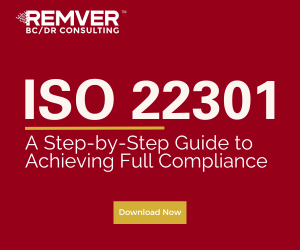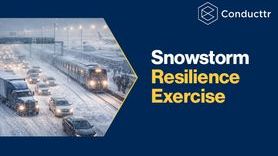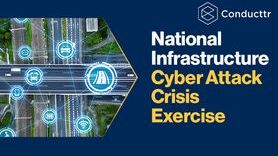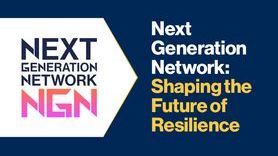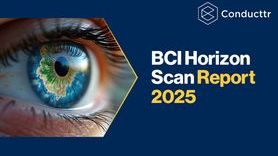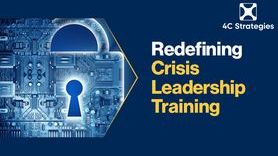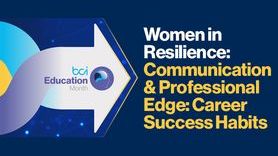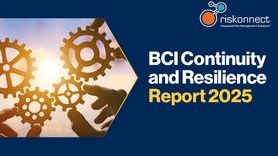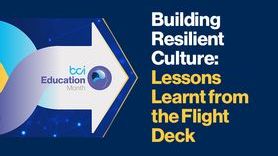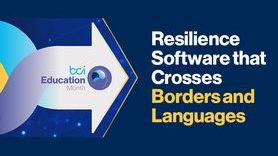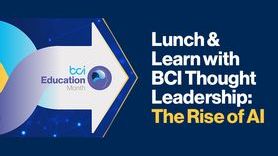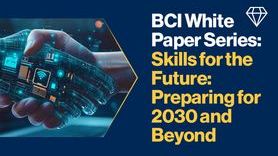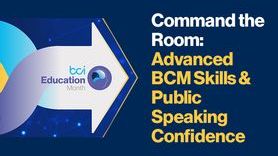In Conversation with Hamide Karakaya AMBCI
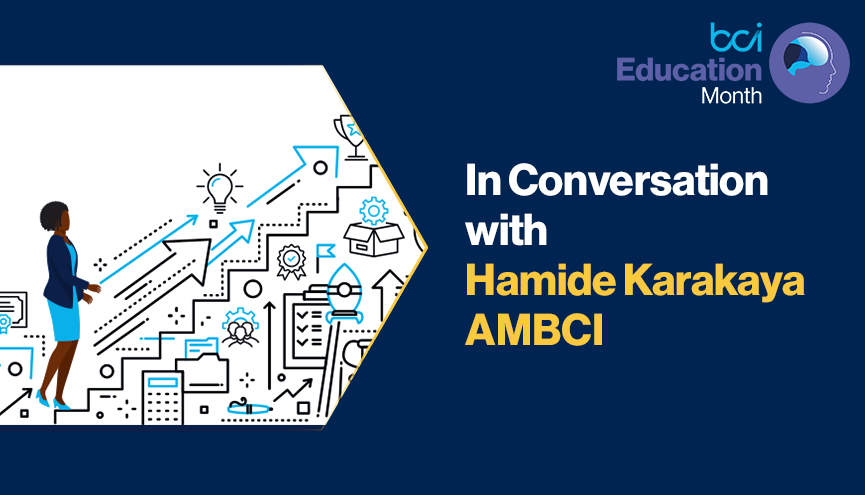

As part of Education Month, we spoke with Hamide Karakaya AMBCI, an Operational Resilience Manager in the insurance sector (UK), about the role of training and education in her journey in this sector and the importance of both soft and hard skills.
Can you tell us about your experience in the field of BC and resilience?
I graduated as an Industrial Engineer and, for the first three years of my career, I worked as a Business Analyst (BA) on credit card and payment projects for a bank. This experience taught me the importance of processes because, when you work as a BA, you need to understand elements of the process, such as the applications, data, human resources, etc.
After this, I shifted to the Business Continuity Management (BCM) team at the same bank. It sounded interesting to me and I wanted to take the opportunity, but I didn’t have any experience or training when I joined the team. Although, working as a BA for three years really helped me when I first joined the team. Over the last 10 years, I have been working in this area for different organizations and in different positions (consultant manager, in-house manager, etc.) Now, I truly understand the fundamentals of Business Continuity (BC) and understand the processes involved.
I’ve changed lots of sectors over time but I think the best thing about BCM and crisis management is that it doesn’t matter which sector you are working in, when you have the experience and knowledge, you can work anywhere and find a place at the table.
I have really enjoyed the past 10 years, despite having many crises to manage. But still, at the end of each one, I see that we are doing a great job as BCM specialists.
What types of crisis have you experienced over your career?
In the early days of my career, I was based in Turkey where there are different types of threats, including terrorist attacks. Back then, the organization I was working for had several branches in different cities and some were located near the border, where terrorist attacks were more likely to occur.
I also managed an IT incident which resulted in us losing our data centre for almost six hours. It was a bank, so the outage affected online real-time transactions, all the credits cards and money withdrawals, etc. It was a disaster for us and we had to manage the customer relationship effectively.
I’m now based in the UK, around a year ago our organization suffered a large-scale ransomware attack, which was very difficult to manage and posed significant challenges.
In an ever-changing environment, how important are training and education to make sure that you are prepared for newly emerging threats and risks?
The environment is rapidly changing. All BC practitioners now have a different agenda compared to five years ago. We are now focusing on cyber resilience, regulatory requirements, third-party risks and ESG. The agenda is always changing and we have to keep up with the latest threats and trends, otherwise we wouldn’t be able to plan, prepare and make efficient decisions. As practitioners, we have to understand what’s happening in the world and what the emerging risks are; as organizations, we have to understand how to prepare for those risks.
To be prepared, you need to have training and you need to educate yourself. This can be done by reading through material, joining webinars or talking with other practitioners. The BCI is a good resource for this. Also, having your own network and reaching out to people from different industries is key. Preparation is critical because you don’t have time to plan things when the crisis happens.
What role have educational resources and BC training played in your career?
Over the last 10 years, I’ve had many training opportunities. When I joined the BCM team 10 years ago, the ISO22301 standard had just been released. I realised that I needed to be trained to understand the standard and, as an organization, we need to be compatible with the standard, so I immediately joined the BSI training. I first joined at a foundational level, then as a practitioner and finally as a lead auditor.
After that, I moved to Germany and worked in a fintech company as the head of BCM. During that time, I attended the CBCI Certification Course, delivered by The BCI, to gain my credentials. The credentials were a great benefit of course, but I also learned a lot of tips and tricks from the instructor, and also from the other course participants because it was an open forum where we could share experience.
All of this training was really helpful for me to build my hard skills and knowledge in this area.
As an experienced BC practitioner, what skills would you say are important to build in this sector? What skills are you looking to reinforce/acquire in the future?
Besides the hard skills, professionals joining the sector need to focus on their soft skills as well. Problem solving and effective communication are two of the most important soft skills that everyone in this area, not only the young practitioners, should focus on. Problem solving will help you when you have a crisis, as you simply can’t prepare for every crisis scenario.
Effective communication is also key because we are engaging with executives and talking with different business units. We may sometimes even need to convince them that BC is important and why a certain course of action is necessary. To enable this, you should have the required communication skills. It’s important to remember that BC is not always on everyone’s agenda, so good communication skills are key for when you go to someone in your organization with a BIA update or a BCP update.
Personally, I think I have developed these skills. Although, as I’ve mentioned, the agenda is always changing and right now ESG is on everyone’s agenda. Therefore, I want to expand my knowledge in this area by reading reports and attending webinars, etc.
How important is it to share experience and knowledge with other BC practitioners, as well as with those just entering the industry? What are the most effective ways to do this?
When I first joined the BC sector, I used webinars and panel discussions. They are really helpful and I think the best way to share experience with each other. You are hearing from different sectors, both junior and experienced professionals, and you can build your knowledge by connecting with those people afterwards to share experience.
Alongside those hosted by The BCI, other panels are also useful. For example, in the UK, the PRA and FCA released their operational resiliency paper and last year we had to focus on this to meet the regulatory requirements. The PRA and FCA hosted lots of industry events and, in the insurance industry, Lloyd’s also hosted lots of events to share experience.
Also, during the pandemic we noticed that we can do some events virtually and this means we can engage with US, Australian or Indian colleagues at appropriate times.
What impact did the pandemic have on sharing knowledge and experience with global colleagues?
I think it made us more flexible. I think we need to be flexible and the pandemic taught us that we can be, especially with the technology available right now. Before the pandemic, we were coming together in a venue in the US or in the UK, but you can’t join as a person from Turkey unless your company approves the cost for you to go.
However, people can join the virtual events from around the world and pay less (or nothing) to share knowledge and ask questions. We can also watch the recordings after the event and learn from them.
What are the pathways/opportunities available for young professionals that choose a career in BC & Resilience?
When I look at LinkedIn, I see lots of job opportunities in this sector. If someone is interested in this area but doesn’t know where to start, I would suggest they apply for a junior role. That’s because the key thing is just getting into the sector. When they start, I am sure they will enjoy it and expand their knowledge.
When I joined the BCM team, as I said, I didn’t know BC specifically. As I came from Industrial Engineering, I understood processes and had a technical background, but didn’t know about BIA or BCP. When I joined, my manager at that time spent time with me and taught me the key things and then I received the training. So, when young professionals see a job in this sector they shouldn’t think ‘Oh, I don’t have 5 of those 10 aspects they’re asking for’. They should apply for it. If they have the soft skills, they will be selected and they can build their hard skills by doing the role.
What are organizations looking for from young professionals joining this field?
I was searching for a team member at the beginning of this year. For me, it doesn’t matter whether a candidate has full knowledge of the sector. I think understanding processes and the relationship between different disciplines, such as business operation and IT, for example, is important. It is also possible to understand the regulatory requirements, as regulatory requirements are available for everyone to access. You might not be able to fully understand the regulations, but if you have an idea of what’s happening in the world right now, and what the trending topics are in this area, that is beneficial per se.
With regards to soft skills, being pro-active, having the ability to work under stress and having the willingness to learn would all be positives for young talent in this sector. For me, when I hired my Operational Resilience Analyst in March, she didn’t have the full set of skills, but I was convinced that she could learn because she showed that she wanted to learn, she was interested in this area and was pro-active. When I felt this energy in the interview, I believed in it and I hired them.
That’s why they shouldn’t be afraid to apply to jobs if they have the soft skills. What I can suggest as well, if they want to use this time for their benefit, they can focus on attending certification courses so they can gain their CBCI certification and gain the knowledge of best practice and guidelines. Then when they apply to these jobs, they can feel more confident and I am sure they will learn when they join the company.
How can BC practitioners prepare to take the next step or advance in their BC/resilience career?
I think they should start connecting with senior experts to understand what’s happening in their world. I have a different understanding from five years ago because I am now engaged with senior staff members like the CEO, CSO, or Chief Risk Officer. I now know their perspective and how they consider BC.
Sometimes, as a BC practitioner, we have some blindness to it because it’s our job. Over the years, I think I’m starting to reduce that blindness and look at the big picture. However, young professionals, because they are doing the operational job, they are handling the BIAs, BCPs and probably focusing on day-to-day tasks. So that’s why I suggest they start engaging with senior practitioners to understand the bigger picture and maybe a mentor relationship will be beneficial for them. Once they work with them, they can start to expand their lens to the sector, to the industry and the entire resiliency topic.
Should they consider looking for a mentor then?
I think they should do both. Soft skills can’t be learned in one day, but they should have a mentor as it will help them learn about the soft skills, about being pro-active and how to focus on problem-solving. Having a mentor in the industry will teach them about how to react to crisis, for example, because those senior practitioners have handled lots of crises and they may have experience which can help them when they find themselves in that position.
Is there anything else you wish to share about your experience as a BC practitioner?
I want to use this opportunity to say that BC is a great area to work in. You can never get bored. When I look at my other classmates from university, of course they are doing great jobs and are in great positions, but it feels like they are doing the same job over the years. While I am doing the same job in BC, sectors are always changing or the risks are changing.
Five years ago, as I said, the risks were mainly customer risks or terror risks, but now I’m focusing on the cyber risk or environmental change. It’s always changing and I never feel like I’m doing the same job over and over. I’m always telling my young colleagues that if I ever had to start again, I would do the same job because I enjoy it that much. So I really encourage people, especially young people, to work on a BCM pathway.
Learn more about Education Month 2022:
To be the first to know about BCI News and more follow us on LinkedIn here, or on Twitter @TheBCEye



